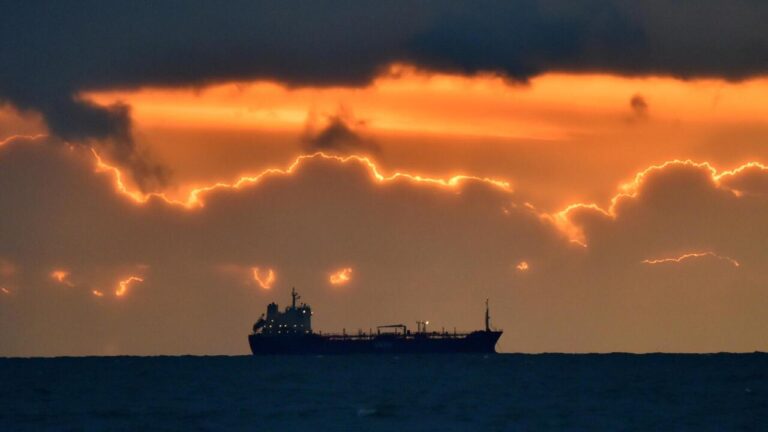French authorities have launched an investigation into an oil tanker recently identified on a list of vessels targeted by sanctions against Russia’s so-called “shadow fleet.” The move underscores growing international scrutiny of maritime operations alleged to aid Russia in circumventing economic restrictions. This development comes amid ongoing efforts by Western nations to enforce sanctions aimed at curbing Moscow’s ability to fund its activities amid heightened geopolitical tensions. The probe into the tanker’s activities signals France’s commitment to upholding the integrity of these measures and combating illicit maritime practices.
France Launches Probe into Oil Tanker Linked to Russia Shadow Fleet Sanctions
French authorities have initiated a formal investigation targeting an oil tanker reportedly associated with the so-called Russia “shadow fleet”, a network of vessels believed to be circumventing Western sanctions imposed amid ongoing geopolitical tensions. The probe aims to uncover potential violations related to the European Union’s sanctions framework designed to restrict the movement and operation of ships linked to sanctioned Russian entities. Officials are scrutinizing the tanker’s ownership, cargo manifest, and recent transactions to determine compliance with international maritime laws.
Key concerns revolve around the tactics employed by this shadow fleet to obscure ownership and facilitate covert oil shipments. Authorities are particularly focused on:
- Transshipment practices that mask oil origin
- Flag changes to avoid detection
- Discrepancies in AIS (Automatic Identification System) data patterns
These tactics complicate enforcement efforts and highlight the growing challenges posed by sophisticated sanction evasion schemes. France’s investigative steps underscore a broader international commitment to ensure transparency and accountability in maritime commerce linked to sanctioned regions.
Implications for Global Energy Security and Sanctions Enforcement
As major economies grapple with the ongoing geopolitical tensions surrounding Russia, the investigation into oil tankers identified as part of the so-called “shadow fleet” underscores the complexities of enforcing sanctions on global energy trade. These clandestine operations not only undermine international policy but also expose critical vulnerabilities in the global energy supply chain, risking instability in markets heavily dependent on uninterrupted oil flow. France’s probe highlights the escalating need for enhanced maritime surveillance and cross-border cooperation to detect and curtail illicit activities that evade existing regulatory frameworks.
With sanctions designed to pressure Russia economically, the ability of shadow fleets to operate undetected creates a loophole that weakens collective diplomatic efforts. Effective sanctions enforcement relies on:
- Advanced tracking technology and data transparency to monitor vessel movements
- Stronger international partnerships for intelligence sharing and legal action
- Adaptive policies that account for new evasive tactics in maritime logistics
| Aspect | Impact | Response |
|---|---|---|
| Sanctions Evasion | Undermines economic pressure | Increased maritime patrols |
| Energy Market Stability | Risk of supply disruptions | Diversification of supply sources |
| International Collaboration | Essential for enforcement | Joint investigations and sanctions |
Analyzing the Role of Shadow Fleets in Evading International Restrictions
Shadow fleets, which consist of vessels registered under obscure or flag-of-convenience registries, have become a key tool for evading international sanctions, particularly those targeting Russia’s oil exports. These fleets employ sophisticated tactics such as frequent ship-to-ship transfers, altering AIS (Automatic Identification System) signals, and reflagging under different countries to obscure the true ownership and destination of the oil cargos. This complex web of maritime camouflage allows sanctioned entities to continue operations with reduced risk of detection, complicating enforcement efforts by global authorities.
France’s recent probe into one such oil tanker emphasizes the growing challenge posed by shadow fleets to global regulatory frameworks. The investigation highlights several crucial factors:
- Regulatory gaps: Diverse maritime laws across jurisdictions create loopholes exploited by shadow fleets.
- Technological obfuscation: Deliberate AIS signal manipulation hinders real-time monitoring.
- Global supply chain impact: Shadow fleets introduce uncertainty into oil markets, affecting pricing and transparency.
| Shadow Fleet Tactic | Impact | Countermeasure |
|---|---|---|
| Ship-to-ship transfers | Conceals cargo origin | Enhanced satellite surveillance |
| AIS signal tampering | Masks vessel movements | Real-time data analytics |
| Reflagging vessels | Evades flag state sanctions | International registry cooperation |
Policy Recommendations to Strengthen Maritime Sanctions Compliance
To enhance the effectiveness of maritime sanctions enforcement, it is crucial to implement robust tracking and verification mechanisms. Governments and international bodies should invest in advanced satellite surveillance and automated vessel identification systems to detect discrepancies between ship registration and operational behavior. Additionally, fostering stronger collaboration between customs agencies, port authorities, and intelligence services across jurisdictions will improve real-time information sharing, minimizing loopholes exploited by entities like the so-called “shadow fleet.”
Policy frameworks must also mandate transparent ownership disclosure and impose stringent penalties for non-compliance. Introducing a standardized global registry for tanker ownership and flagging status could deter sanction evasion. Key recommendations include:
- Enhanced vetting of vessel registration to prevent shell companies from masking true ownership
- Increased funding for maritime law enforcement to conduct inspections and audits more frequently
- Harsher legal consequences for intermediaries facilitating transactions with blacklisted vessels
- Regular updates to sanction lists based on real-time intelligence to stay ahead of evasive tactics
The Conclusion
As the investigation unfolds, authorities in France continue to scrutinize the activities of the oil tanker linked to Russia’s so-called “shadow fleet,” reflecting heightened international efforts to enforce sanctions and curb alleged illicit maritime operations. The case underscores the ongoing challenges faced by global regulators in monitoring and intercepting sanctioned entities operating within complex maritime networks. Further developments are expected as the probe progresses, with potential implications for broader enforcement measures targeting sanctioned Russian assets.




